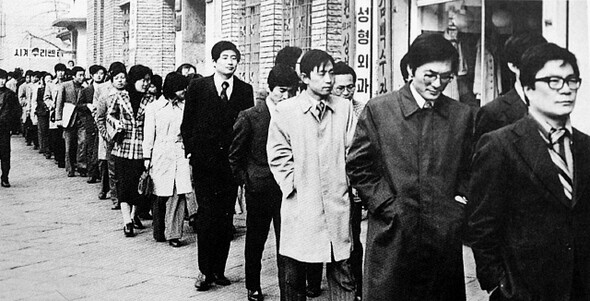hankyoreh
Links to other country sites 다른 나라 사이트 링크
Supreme Court overturns case on wrongful terminations of journalists

The Supreme Court recently issued a number of decisions overturning a Truth and Reconciliation Commission ruling finding the Park Chung-hee regime (1961-79) and Dong-A Ilbo newspaper responsible for wrongful terminations at the newspaper in 1974 and ordering payment of damages in connection with the dismissals.
The decisions mean a victory for the state, the Park administration, and the Dong-A Ilbo in a forty-year battle by the Dong-A Committee for Free Press.
The Supreme Court’s second division under Justice Kim Chang-seok ruled on June 16 that it had overturned the original court ruling in a case filed by the Dong-A Ilbo against the state claiming its reputation had been damaged by the Truth and Reconciliation Commission’s false claim that it had “capitulated to the administration” in dismissing the journalists.
“While [the claim] may be viewed ultimately as illegally because of the mistaken acknowledgement of facts in the Truth and Reconciliation Commission decision, there is no evidence to conclude that the government employee in question violated objective duty of care,” the court said.
“Substantial grounds also exist to conclude that the Commissions believed in the truth [of pressure from the regime] when it announced the decision,” it added, dismissing the state‘s liability for payment of damages.
In 1974, Dong-A Ilbo journalists published a “declaration of the practice of a free press” to oppose the military government’s controls on the media. In response, the Korean Central Intelligence Agency (precursor to today‘s National Intelligence Service) pressured advertisers into not buying space in the newspaper’s pages. Forced to survive off donations from the public, the newspaper dismissed or gave indefinite suspensions to 124 journalists.
In 2008, the Truth and Reconciliation Commission issued a decision stating that the Dong-A Ilbo had bowed to pressure from the administration and dismissed large numbers of reporters.
In response, the newspaper filed suit against the state demanding the decision be overturned and requesting damages for defamation. The six-year-long suit ended last month when the Supreme ourt‘s third division under Justice Min Il-young overturned the Commission’s ruling, arguing that “sufficient causality” had not been established to show the newspaper had “capitulated” to the administration in firing the journalists.
In December 2014, Justice Shin Young-chul of the court’s second division reversed and remanded a lower-court ruling in a case filed by fired Dong-A Ilbo journalists demanding compensation from the state. The lower court had previously ruled against 14 of the 100 journalists who did not receive “democracy campaign” compensation owing to the statute of limitations.
“The question of whether a causal relationship exists between the advertising suppression and the dismissals will need to be reviewed,” Shin said at the time.
But with the Supreme Court ruling last month that a sufficient causal relationship had not been established between the dismissals and government pressure, the chances of the reporters’ compensation claims being recognized appear slim.
Together, the court’s rulings on the Dong-A Ilbo dismissals exempt the state and newspaper from responsibility and block the legal route for the journalists to restore their reputations and earn compensation.
“They’ve basically used legal logic to save the administration’s face,” said attorney Cho Yeong-seon of the group MINBYUN-Lawyers for a Democratic Society.
By Lee Kyung-mi, staff reporter
Please direct questions or comments to [english@hani.co.kr]

Editorial・opinion
![[Editorial] Does Yoon think the Korean public is wrong? [Editorial] Does Yoon think the Korean public is wrong?](https://flexible.img.hani.co.kr/flexible/normal/500/300/imgdb/original/2024/0417/8517133419684774.jpg) [Editorial] Does Yoon think the Korean public is wrong?
[Editorial] Does Yoon think the Korean public is wrong?![[Editorial] As it bolsters its alliance with US, Japan must be accountable for past [Editorial] As it bolsters its alliance with US, Japan must be accountable for past](https://flexible.img.hani.co.kr/flexible/normal/500/300/imgdb/original/2024/0417/6817133413968321.jpg) [Editorial] As it bolsters its alliance with US, Japan must be accountable for past
[Editorial] As it bolsters its alliance with US, Japan must be accountable for past- [Guest essay] Amending the Constitution is Yoon’s key to leaving office in public’s good graces
- [Editorial] 10 years on, lessons of Sewol tragedy must never be forgotten
- [Column] A death blow to Korea’s prosecutor politics
- [Correspondent’s column] The US and the end of Japanese pacifism
- [Guest essay] How Korea turned its trainee doctors into monsters
- [Guest essay] As someone who helped forge Seoul-Moscow ties, their status today troubles me
- [Editorial] Koreans sent a loud and clear message to Yoon
- [Column] In Korea’s midterm elections, it’s time for accountability
Most viewed articles
- 1Samsung barricades office as unionized workers strike for better conditions
- 2[Column] The clock is ticking for Korea’s first lady
- 3[Editorial] When the choice is kids or career, Korea will never overcome birth rate woes
- 4S. Korea, Japan reaffirm commitment to strengthening trilateral ties with US
- 5[Editorial] As it bolsters its alliance with US, Japan must be accountable for past
- 6[Guest essay] How Korea turned its trainee doctors into monsters
- 7Japan officially says compensation of Korean forced laborers isn’t its responsibility
- 8[News analysis] After elections, prosecutorial reform will likely make legislative agenda
- 9[Editorial] Does Yoon think the Korean public is wrong?
- 10Strong dollar isn’t all that’s pushing won exchange rate into to 1,400 range